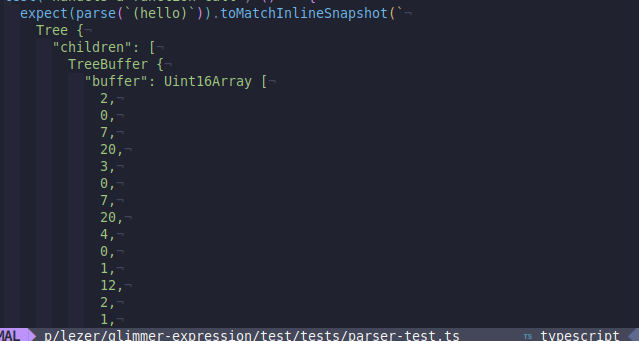I was looking at
And i think that this format is really good for parser testing:
Script(
BlockComment,
VariableDeclaration(let, Identifier, BlockComment, "=", Number))
but, when using expect | Vitest
I’d like to be able to parse to the above format, so that the automatic snapshot updating has this compact syntax within it (rather than use testTree).
Today,
if I do:
test("handels a function call", () => {
expect(parser.parse(`(hello)`)).toMatchInlineSnapshot()
});
after the test suite runs, I get a structure like this:

which makes sense, because the tree object isn’t meant for human’s it’s meant for the editor / codemirror stuff.
but for testing, I’d like to have some sort of “blessed” toString conversion of that that looks more like the expected syntax in the docs.
Something like this:
expect(parser.parse('(hello)').humanReadable()).toEqual(`
Script(
BlockComment,
VariableDeclaration(let, Identifier, BlockComment, "=", Number))
`)
I see that pars of this behavior is provided by the TestSpec here: generator/src/test.ts at main · lezer-parser/generator · GitHub
(though this is the inverse – converting the human-friendly syntax to something compareable to a tree)
I’m still poking through the lezer repos / code – so apologies if this already exists.
lol, it’s just tree.toString()
Good job, me
I have this helper:
import { parser } from "@glimdown/lezer-glimmer-expression";
export function parse(input: string) {
let tree = parser.parse(input);
return tree.toString();
}
and usage:
import { describe, test, expect } from "vitest";
import { parse } from "./util";
test("handels a function call", () => {
expect(parse(`(hello)`)).toMatchInlineSnapshot(
'"Expression(SExpression(CallExpression(\\"(\\",SExpression,\\")\\")))"'
);
});
where the argument to match inline snapshot is:
- filled if missing (by vitest)
- diffed / asserted if present
Diff could be better:
- Expected
+ Received
- "Expression(SExpression(CallExpression(\"(\",SExpression,\")\")))"
+ "Expression(SExpression(CallExpression(\"(\",SExperession,\")\")))"
But maybe there is way to also parse the toString() and add newlines / indentation (this part I can do just fine)
Here is my formatter now,
end:tm: result:
import { describe, test, expect } from "vitest";
import { parse } from "./util";
test("handels a function call", () => {
expect(parse(`(hello)`)).toMatchInlineSnapshot(`
"Expression(
SExpression(
CallExpression(
\\"(\\",SExpression,\\")\\"
)
)
)"
`);
expect(parse(`(hello "there")`)).toMatchInlineSnapshot(`
"Expression(
SExpression(
CallExpression(
\\"(\\",⚠
)
) ,SExpression(
String(
AttributeValueContent
)
) ,⚠(
\\")\\"
)
)"
`);
});
and the test util:
import { parser } from "@glimdown/lezer-glimmer-expression";
export function parse(input: string) {
let tree = parser.parse(input);
let stringifiedTree = tree.toString();
return format(stringifiedTree);
}
function format(flatTree) {
let result = "";
let indent = 0;
let inQuote = false;
let quoteSplit = flatTree.split(/("[^"]+")/g);
let sections = quoteSplit
.map((s) => {
if (s.startsWith('"') && s.endsWith('"')) {
return s;
}
return s.split(/([()])/g);
})
.flat()
.filter(Boolean);
// Combine groups of non ( or )
let combined = sections.reduce((acc, current) => {
let last = acc[acc.length - 1];
if (last) {
if (!last.endsWith("(") && last !== ")") {
if (current !== "(" && current !== ")") {
acc[acc.length - 1] = last + current;
return acc;
}
}
if (!last.endsWith("(") && current === "(") {
acc[acc.length - 1] = last + current;
return acc;
}
}
acc.push(current);
return acc;
}, []);
for (let section of combined) {
if (section.endsWith("(")) {
if (inQuote) break;
result += indentFor(indent) + section + "\n";
indent += 2;
} else if (section.endsWith(")")) {
if (inQuote) break;
indent -= 2;
result += "\n" + indentFor(indent) + section;
} else {
result += indentFor(indent) + section;
}
}
return result;
}
function indentFor(size = 0) {
return Array(size).fill(" ").join("");
}
Still needs some formatting work.
But what I like about this workflow is that I can spot check the tests / diffs as I go and just decide to delete all the snapshots if I need to change things, and the test framework will fill in the “expected” for me
